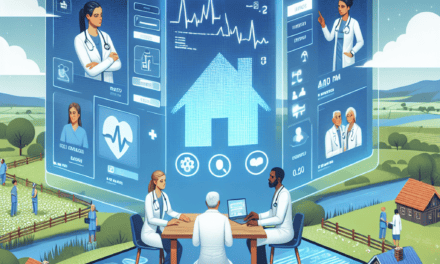Nurses at the Forefront: Shaping the Future of Primary Care
As the healthcare landscape continues to evolve, nurses are increasingly recognized as pivotal players in shaping the future of primary care. With their extensive training, clinical expertise, and patient-centered approach, nurses are not only providing essential services but also driving innovations that enhance healthcare delivery. This article explores the multifaceted role of nurses in primary care, examining their contributions, challenges, and the future of nursing in this critical sector.
The Evolving Role of Nurses in Primary Care
The role of nurses in primary care has undergone significant transformation over the past few decades. Traditionally viewed as support staff, nurses are now taking on more autonomous roles, often serving as primary care providers themselves. This shift is largely driven by the increasing demand for healthcare services, particularly in underserved areas.
According to the American Association of Colleges of Nursing (AACN), the number of nurse practitioners (NPs) has surged, with over 325,000 NPs practicing in the United States as of 2021. This growth reflects a broader trend towards utilizing advanced practice registered nurses (APRNs) to meet the healthcare needs of diverse populations.
- Autonomy and Advanced Practice: NPs and clinical nurse specialists (CNSs) are now authorized to diagnose and treat patients, prescribe medications, and manage chronic conditions. This autonomy allows for more comprehensive care and reduces the burden on physicians.
- Patient-Centered Care: Nurses are trained to adopt a holistic approach to patient care, focusing not only on physical health but also on emotional and social well-being. This patient-centered model is essential in primary care, where understanding the patient’s context can lead to better health outcomes.
- Collaboration with Other Healthcare Professionals: Nurses work collaboratively with physicians, pharmacists, and other healthcare providers to create integrated care plans. This teamwork is crucial in managing complex cases and ensuring continuity of care.
As the healthcare system shifts towards value-based care, the role of nurses will continue to expand, emphasizing their importance in improving patient outcomes and reducing healthcare costs.
Addressing Healthcare Disparities
Nurses play a critical role in addressing healthcare disparities, particularly in underserved communities. These disparities often stem from socioeconomic factors, geographic barriers, and systemic inequities that limit access to quality healthcare.
Research indicates that individuals in rural and low-income urban areas face significant challenges in accessing primary care services. According to the Health Resources and Services Administration (HRSA), approximately 80 million people live in areas designated as Health Professional Shortage Areas (HPSAs), where there is a shortage of primary care providers.
- Community Outreach Programs: Nurses often lead community health initiatives aimed at educating populations about preventive care, chronic disease management, and healthy lifestyle choices. For example, the Nurse-Family Partnership program has demonstrated success in improving maternal and child health outcomes through home visits by nurses.
- Telehealth Services: The COVID-19 pandemic accelerated the adoption of telehealth, allowing nurses to reach patients in remote areas. Telehealth services have proven effective in managing chronic conditions and providing mental health support, thereby reducing barriers to care.
- Culturally Competent Care: Nurses are trained to provide culturally sensitive care, which is essential in addressing the unique needs of diverse populations. By understanding cultural beliefs and practices, nurses can build trust and improve patient engagement.
By actively engaging with communities and advocating for equitable healthcare access, nurses are instrumental in reducing disparities and promoting health equity.
The Impact of Technology on Nursing Practice
Technology is reshaping the landscape of primary care, and nurses are at the forefront of this transformation. From electronic health records (EHRs) to telemedicine, technology enhances the efficiency and effectiveness of nursing practice.
The integration of EHRs has streamlined documentation processes, allowing nurses to spend more time with patients rather than on paperwork. A study published in the Journal of Nursing Administration found that EHRs improved communication among healthcare providers and reduced medication errors.
- Telehealth Innovations: Telehealth has become a vital tool for nurses, enabling them to provide care remotely. This technology is particularly beneficial for managing chronic diseases, conducting follow-up appointments, and offering mental health services.
- Wearable Health Technology: Devices such as smartwatches and fitness trackers allow nurses to monitor patients’ health metrics in real-time. This data can inform care decisions and empower patients to take an active role in managing their health.
- Artificial Intelligence (AI) and Data Analytics: AI is increasingly being used to analyze patient data, predict health trends, and identify at-risk populations. Nurses can leverage these insights to tailor interventions and improve patient outcomes.
As technology continues to evolve, nurses must adapt to new tools and methodologies, ensuring they remain effective advocates for their patients in a digital age.
Education and Professional Development
The future of nursing in primary care hinges on ongoing education and professional development. As healthcare becomes more complex, nurses must continually update their skills and knowledge to provide high-quality care.
Advanced education programs, such as Doctor of Nursing Practice (DNP) and Master of Science in Nursing (MSN), prepare nurses for leadership roles in primary care. These programs emphasize evidence-based practice, healthcare policy, and advanced clinical skills.
- Continuing Education Requirements: Many states require nurses to complete continuing education (CE) credits to maintain their licenses. These requirements ensure that nurses stay current with the latest advancements in healthcare.
- Interprofessional Education (IPE): IPE programs encourage collaboration among healthcare students from various disciplines. By learning together, future healthcare providers can develop teamwork skills essential for effective primary care.
- Mentorship and Leadership Opportunities: Experienced nurses can mentor new graduates, fostering a culture of learning and professional growth. Leadership roles in nursing organizations also provide opportunities for nurses to influence policy and practice.
Investing in education and professional development is crucial for nurses to adapt to the changing demands of primary care and to continue shaping the future of healthcare delivery.
The Future of Nursing in Primary Care
The future of nursing in primary care is bright, with numerous opportunities for growth and innovation. As healthcare systems worldwide grapple with challenges such as an aging population, rising chronic disease prevalence, and workforce shortages, nurses will play an increasingly vital role in addressing these issues.
Several trends are shaping the future of nursing in primary care:
- Increased Demand for Primary Care Services: As the population ages and more individuals seek preventive care, the demand for primary care services will continue to rise. Nurses will be essential in meeting this demand, particularly in underserved areas.
- Expansion of Telehealth: The success of telehealth during the pandemic has led to its continued integration into primary care. Nurses will need to embrace this technology to provide accessible and efficient care.
- Focus on Preventive Care: The shift towards value-based care emphasizes preventive services. Nurses will be instrumental in promoting health education, screenings, and lifestyle modifications to prevent chronic diseases.
As healthcare continues to evolve, nurses will remain at the forefront, shaping the future of primary care through their expertise, compassion, and commitment to patient-centered care.
Conclusion
Nurses are undeniably at the forefront of shaping the future of primary care. Their evolving roles, commitment to addressing healthcare disparities, integration of technology, emphasis on education, and adaptability to changing healthcare demands position them as essential contributors to the healthcare system. As we look ahead, it is crucial to recognize and support the vital work of nurses in primary care, ensuring they have the resources and opportunities needed to continue making a positive impact on patient health and community well-being.
In summary, the future of primary care is bright with nurses leading the charge. By embracing their roles as advocates, educators, and innovators, nurses will continue to transform healthcare delivery, ensuring that all individuals have access to high-quality, patient-centered care.





